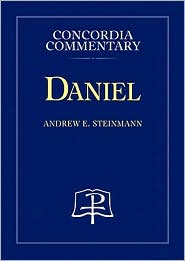Daniel — Andrew E. Steinmann


This Sunday morning I’m beginning a small series on Daniel. One of the great things about living in Hamilton is having access to our seminary library and some great commentaries. I found this volume by Andrew E. Steinmann to be especially helpful as I was working on Daniel 1 this week: Daniel. It’s part of the Concordia series, subtitled “A Theological Exposition of Sacred Scripture.” As the name “Concordia” hints, this is produced by Lutherans, and, so far as I can tell, solid confessional Lutherans. According to the blurb on the front flap, “The commentary fully affirms the divine inspiration, inerrancy and authority of Scripture as it emphasizes ‘that which promotes Christ’ in each pericope.
One of the interesting features is a section of the introduction which explores law and gospel in Daniel. Sometimes Lutherans are caricatured as being fixated on the law as an instrument to expose sin and drive us to Christ. However, here’s what Steinmann says about the Law in Daniel: “Since Daniel is primarily depicting the voluntary and joyful commitment of God’s people to his Law, most of the examples of the Law in Daniel are in the category of the third use of the Law” (34). In other words, Daniel is more about the law as a guide for thankful living in response to God’s grace. That sounds familiar.
Another commendatory feature of this commentary is its focus on textual details. The series editor explains:
This commentary series pays heed to the smallest of textual details because of its acceptance of plenary and verbal inspiration and interprets the text in light of the whole of Scripture, in accord with the analogy of faith, following the principle that Scripture interprets Scripture. The entirety of the Bible is God’s Word, sacred Scripture, calling for theological exposition. (xiii, italics original)
The Hebrew and Aramaic thus receive careful analysis and this drives the exposition. It’s really encouraging to use a commentary that takes the Word of God seriously on its own terms.
Also, I skipped ahead and checked out its eschatological orientation. This becomes important in the second half of Daniel. Steinmann is an amillennialist.
Overall, this is one of the best commentaries that I’ve used. I’ll definitely be checking out the other volumes in this series.


